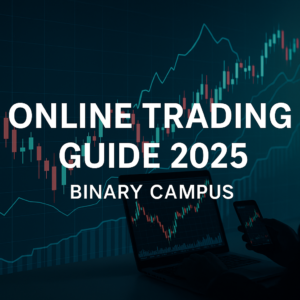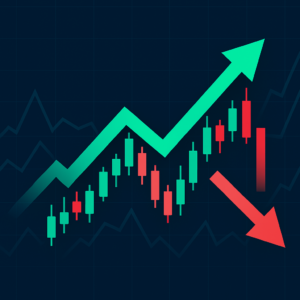I. Introduction
Trading refers to the buying and selling of financial instruments such as stocks, currencies, and commodities, with the goal of making a profit. Trading is a popular activity that offers the potential for substantial returns, but it is also a highly risky venture that requires extensive knowledge and skill. This is where education plays a crucial role.
The importance of education in trading cannot be overstated. A solid trading education equips traders with the knowledge and skills needed to make informed trading decisions and minimize their risk of losses. Without proper education, traders may find themselves at a significant disadvantage in the highly competitive world of trading.
Education in trading covers a broad range of topics, including market analysis, risk management, trading psychology, and technical analysis. By understanding these concepts and applying them in practice, traders can make informed decisions about when and how to enter and exit trades, manage their risks, and maximize their profits.
In summary, education is a vital component of successful trading. With the right education and training, traders can improve their chances of success in the highly competitive world of trading.
II. The Importance of Education in Trading

A. Understanding the Significance of Education in Trading
Education plays a vital role in the success of a trader. Traders who have received proper education and training are better equipped to navigate the complex and ever-changing world of financial markets. Education helps traders understand the intricacies of financial markets, including the impact of economic events, market trends, and geopolitical factors. It also equips them with the skills and knowledge needed to analyze market data, identify potential opportunities, and make informed trading decisions.
Moreover, education helps traders develop a disciplined and consistent approach to trading. It teaches them to manage their emotions and avoid impulsive decisions that can lead to significant losses. By sticking to a well-defined trading plan and using proper risk management techniques, educated traders can reduce their exposure to market risks and protect their trading capital.
B. The Benefits of Proper Education in Trading
Proper education in trading has many benefits. One of the most significant benefits is that it can improve a trader’s profitability. By understanding the fundamentals of financial markets and the techniques used to analyze them, traders can identify profitable opportunities and make informed trading decisions. Education also helps traders develop a trading plan that takes into account their risk tolerance, trading goals, and available resources. By following a well-defined plan, traders can achieve more consistent results and reduce their exposure to risk.
Another benefit of education in trading is that it helps traders develop a disciplined approach to trading. Trading can be an emotionally challenging activity, and traders who lack discipline may be tempted to make impulsive decisions based on fear or greed. Proper education teaches traders to control their emotions, develop a consistent trading routine, and stick to their trading plan.
C. The Pitfalls of Inadequate Education
The absence of proper education in trading can lead to significant losses and missed opportunities. Traders who lack proper education may not have the necessary skills to analyze market data and identify potential opportunities. They may also be more susceptible to making impulsive decisions based on emotions rather than sound analysis.
Additionally, inadequate education can lead to poor risk management, which can result in significant losses. Traders who do not understand the importance of risk management may not use appropriate stop-loss orders or position-sizing techniques, leading to large losses that can wipe out their trading capital.
III. What to Look for in a Trading Education

A. Essential Topics to Cover in a Trading Education
When looking for a trading education, it is essential to ensure that the course covers the essential topics necessary for successful trading. These topics include market analysis, risk management, trading psychology, technical analysis, and money management.
Market analysis involves understanding the various market forces that can influence the price of financial instruments, including economic indicators, geopolitical events, and news releases. Risk management is the process of identifying potential risks and implementing strategies to mitigate them. Trading psychology is the study of how emotions can affect a trader’s decision-making process. Technical analysis involves using charts and technical indicators to analyze market trends and identify potential trading opportunities. Money management involves managing trading capital effectively to minimize losses and maximize profits.
B. The Importance of Practical Training in Trading
Practical training is essential for traders to apply their knowledge and develop their skills in real-world trading scenarios. A good trading education should provide practical training through simulated trading environments or live trading accounts. This allows traders to test their strategies and techniques in a controlled environment without risking their trading capital.
Furthermore, a good trading education should provide access to experienced mentors or coaches who can guide traders through their learning journey and provide feedback on their performance.
C. Availability of Resources to Supplement Education
In addition to comprehensive trading education, it is essential to have access to resources that can supplement traders’ knowledge and skills. These resources include online forums, webinars, trading communities, and research tools.
Online forums provide traders with a platform to exchange ideas, share experiences, and ask questions. Webinars are online seminars that provide traders with expert insights on various trading topics. Trading communities allow traders to connect with like-minded individuals who share similar interests and goals. Research tools provide traders with access to market data, news, and analysis, which can help inform their trading decisions.
IV. How to Get a Proper Education in Trading

A. Different Educational Options for Trading
There are various options available for traders who want to obtain a proper education in trading. These options include self-education, mentorship, and formal education.
B. Self-Education: Benefits and Drawbacks
Self-education involves learning about trading through books, online resources, and trading forums. This option is ideal for individuals who prefer to learn at their own pace and have a limited budget. However, self-education requires self-discipline, as traders need to be committed to their learning journey. Additionally, self-education can be overwhelming, as traders may not know where to start or which resources to trust.
C. Mentorship: Benefits and Drawbacks
Mentorship involves learning from experienced traders who provide guidance, support, and feedback. This option is ideal for individuals who want to learn from real-world trading experience and benefit from the insights of successful traders. However, mentorship can be expensive, as traders need to pay for the services of a mentor. Additionally, finding a reliable mentor can be challenging, as not all traders are suitable mentors.
D. Formal Education: Benefits and Drawbacks
Formal education involves enrolling in a trading course or degree program offered by educational institutions. This option is ideal for individuals who want a structured and comprehensive learning experience and a recognized qualification. Formal education provides access to experienced educators, practical training, and a wide range of resources. However, formal education can be expensive, and the quality of education can vary depending on the institution.
E. Choosing the Right Educational Path
When choosing the right educational path, traders should consider their learning style, budget, and career goals. Traders who prefer a self-directed approach may benefit from self-education, while those who prefer a structured approach may prefer formal education. Traders who want to learn from experienced traders may benefit from mentorship. Ultimately, the right educational path depends on the individual’s preferences, resources, and goals.
V. Conclusion
Proper education is essential for traders who want to succeed in the competitive world of trading. Through education, traders can gain the knowledge, skills, and confidence needed to make informed trading decisions and manage risks effectively.
In this article, we have highlighted the significance of education in trading, the benefits of proper education, and the pitfalls of inadequate education. We have also discussed the essential topics to cover in trading education, the importance of practical training, and the availability of resources to supplement education.
Furthermore, we have presented the different educational options available to traders, including self-education, mentorship, and formal education. By considering the benefits and drawbacks of each option and choosing the right educational path, traders can optimize their learning experience and increase their chances of success.
In conclusion, we encourage traders to seek out proper education in trading and invest in their learning journey. By prioritizing education and continuously improving their knowledge and skills, traders can achieve their financial goals and thrive in the dynamic and challenging world of trading.
FAQs
- What is the importance of education in trading?
Education is essential for traders who want to succeed in trading. Through education, traders can gain the knowledge, skills, and confidence needed to make informed trading decisions and manage risks effectively.
2. What are the benefits of proper education in trading?
Proper education can help traders to:
- Understand market dynamics and trading strategies
- Develop analytical skills and technical analysis proficiency
- Learn risk management techniques
- Build trading discipline and emotional control
- Network with other traders and industry professionals
- What are the pitfalls of inadequate education in trading?
Inadequate education can lead to:
- Poor trading decisions and uncontrolled risks
- Inability to manage losses and recover from setbacks
- Lack of trading discipline and emotional control
- Failure to adapt to changing market conditions
- Limited networking and career opportunities
- What are the essential topics to cover in trading education?
Essential topics to cover in a trading education include:
- Market fundamentals and economic indicators
- Technical analysis and charting
- Risk management and trading psychology
- Trading platforms and tools
- Trading strategies and styles
- What is the importance of practical training in trading?
Practical training is important in trading as it allows traders to apply theoretical knowledge to real-world trading scenarios. Practical training can include paper trading, simulated trading, or live trading with small accounts.
- What are the different educational options available for trading?
The different educational options available for trading include self-education, mentorship, and formal education. Each option has its benefits and drawbacks, and traders should choose the option that best suits their learning style, budget, and career goals.
- How do I choose the right educational path in trading?
To choose the right educational path in trading, traders should consider their learning style, budget, and career goals. Traders who prefer a self-directed approach may benefit from self-education, while those who prefer a structured approach may prefer formal education. Traders who want to learn from experienced traders may benefit from mentorship.
- Is trading education expensive?
The cost of trading education can vary depending on the educational option chosen. Self-education is generally the most affordable option, while mentorship and formal education can be more expensive. However, traders should consider the return on investment in their education, as proper education can lead to increased profitability and career opportunities.
- How can I supplement my trading education?
Traders can supplement their trading education by accessing a wide range of resources, including online courses, trading forums, webinars, blogs, and books. Additionally, traders can network with other traders and industry professionals to learn from their experiences and insights.


